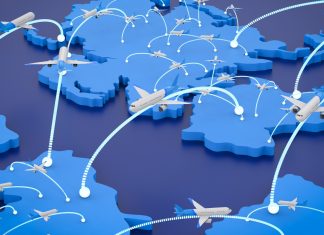
Sabre Corporation has revealed seven trends emerging within the Asia Pacific regions corporate travel management sector.
It is:
- Premium Economy is attracting a loyal corporate following
- Secondary expenses, including ancillary services, are under tighter control
- Better pre-trip planning is reducing the risk of off-policy booking
- Mobile itinerary management apps are now mainstream
- Data analytics will be key to more personalized services
- With more reliance on agents, some see a concierge model emerging
- Technological integration (B2B2C client-servicing) is much more important now
How is it in Scandinavia?
TTO Scandinavia has asked Christer Nordlund, Managing Director, Stockholm, HRG Nordic and Eastern Europe, one of the largest business travel agencies in Scandinavia.
Christer Nordlund is from Sweden and has worked for HRG Nordic since 1998. He has been a member of the Nordic Management Team since 2001 and Managing Director since 2011. During his tenure at HRG, he has worked on various areas Events & Meetings Management, Key Account Management and Operations.
HRG Nordic is part of the global travel agency chain Hogg Robinson Group Plc, who offers a wide range of travel solutions, advisory services, and events for the business travel market to the private and public sectors.
HRG Nordic has full-Nordic coverage with offices in Sweden, Norway, Denmark and Finland. In Sweden in Gothenburg, Kalmar, Malmö and Stockholm. HRG Nordic collaborates globally across national borders in the Nordic region.
Corporate travel is Hogg Robinson’s core business. The HRG network extends to more than 120 countries and a team of 14,000.
Trends
Sabre Corporation has revealed seven trends emerging within the Asia Pacific regions corporate travel management sector.
Over 100 respondents from 15 key markets participated in the Sabre Corporate Travel Practices Survey 2015, representing both dedicated corporate travel management companies and travel agencies, together with a sample of online travel brands servicing corporate accounts.
The evidence is that Asia Pacific agents are managing more travel for these regions demanding corporate clients, while achieving tighter cost control and with technology playing the enabling role. It seems to be happening without compromising the comfort of travelers. In fact this year they are having more of their personal preferences met, said Roshan Mendis, senior vice president, Sabre Travel Network Asia Pacific.
The Sabre Corporate Travel Practices Survey 2015 was conducted from April to May 2015, with respondents based in Australia, Bangladesh, China, Hong Kong, India, Indonesia, Korea, Malaysia, Nepal, New Zealand, Pakistan, Philippines, Singapore, Taiwan and Thailand.
The seven core themes revealed this year are:
- Premium Economy is attracting a loyal corporate following
Christer Nordlund Comment: “For Scandinavian travelers this alternative is mainly relevant on long haul and there we do see the same trend. “
- Secondary expenses, including ancillary services, are under tighter control
Christer Nordlund Comment: “We haven’t seen this as a fact yet, but believe that the more ancillary services we will see, the more this will be included in the travel policy. Many companies are working on this right now.”
- Better pre-trip planning is reducing the risk of off-policy booking
Christer Nordlund Comment: “Yes, same in Scandinavia.”
- Mobile itinerary management apps are now mainstream
Christer Nordlund Comment: “Apps are mainstream, it’s rather what the apps are used for that can differ. The most used ones is for information just before and during the trip, like having the itineraries loaded to get updates on changes like delays, cancellations and changed gates. “
- Data analytics will be key to more personalized services
Christer Nordlund Comment: “But remember that the question is a bit complex in corporate travel since the company profile (from the one who is paying) and the personal wish (from the one who is traveling), sometimes are in conflict. But to a certain extent it will be more common.”
- With more reliance on agents, some see a concierge model emerging
Christer Nordlund Comment: “We do see that for a very limited number of travelers, like a VIP service, but don’t see it as a general trend in Scandinavia.”
- Technological integration (B2B2C client-servicing) is much more important now
Christer Nordlund Comment: “I think that the travelers experience is seen as more important now than 5-6 years ago and technology supports that trend better now. But it is not only a matter of technological integration, the key is the content. The core is still transportation and accommodation and to get the best possible content of that when it comes to products, prices, quality, combinations and user friendliness with a travel policy as one of the basis for the configuration of it. Certainly the development of technology will continue so you can add private things like a theatre ticket, a massage or a restaurant booking in the evening as a private person, but this is not a mayor request as it is now. “
caa























